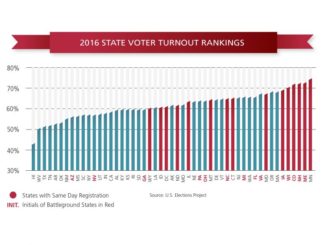by Alex Gonzalez
House Majority Leader Eric Cantor called on the GOP to broaden its focus beyond tax and spending cuts and take up education and other issues of importance to families; which is exact the argument we have made for the last two years; in order for Republicans to woo Latino voters to the GOP, candidates need to change the tone of welfare “takers”–or 47%– just because Latino voter Democrats; they are not the real government takers.” Candidates wanting or needing the Latino vote, need to stick the George W. Bush message of Rio Grande Family values: my conservative values are your family value, and thus, my Republican Party is your Party, too.
With the urgent debate in Congress over the looming “fiscal cliff,” it is vital that Latino voters, and Latino legislators in Congress stay focused on what is at stake–a $2.3 trillion blame game. And regrettably, in this blame game, too often Latinos and young are American are unnecessarily blamed as “government takers” while others get to free-ride the “entitlements empire.” Thus, Latino Republicans need to be prepared to tell the American Public that the National Debt and Deficit have no connection of the growth of the Latino population or young people wishing to have higher education degree. Sure, there is popular unsubstantiated propaganda arguing that Latinos are inherently “government takers” if they vote Democrat, or because they want an education, but that is indeed the greatest myth since entitlement is as more of a “white thing” prompted by aging generations of Americans. Therefore, the “fiscal cliff” and entitlements “epidemic” is not caused by Latinos, or young Americans, but rather by interest groups like AARP, or poor Republican states in the South and “lily-white” New England states with aging populations.
Also, and equally important for conservatives, especially for Latino legislators who will have to deal with issues of education and immigration in Latino communities to woo voters, the Republicans message needs to be succinct that targeting Latinos as government takers is not a viable option . Too, how to deal with the issue of entitlements is important since they will have to point out that young Latinos seeking to get an education are not the root cause of entitlement spending. In the new books by American Enterprise Institute researcher Nichoals Eberstadt, entitlement is not a Latino, or minority problem, but rather a structural Republican and Democrat problem where the main recipient are neither Latinos, nor young people, but rather two generations of Americans who have gotten used to entitlements, and therefore, refuse to give up their “gifts.”
Nichoals Eberstadt’s A Nation of Takers: American’s Entitlement Epidemic, argues that “government Entitlement payment are benefits to which a person holds an established right under the law (i.e., to which a person is entitled.)” In this context, Eberstasdt conclusively suggest that the “Entitlement epidemic” is cultural, generational, Republican and Democrat “epidemic.”
According to Eberstadt, The government of the United States has become colossal empire of an Entitlement machine managing, protecting and financing government programs. As a result, the US government devotes more resources to the public transfer of good to citizens than any other objective. For example, the total transfer of payments in 1960 was only $24 billion but by 2010, the outlay of payment was 100 times more. The magnitude transfer of entitlement outlays is so staggering that In 2010 alone, the government transferred over $2.2 trillion in money goods and services to recipient men, women and children. As a result, entitlement outlays have grown relentlessly in the past three decades, under both Republican and Democrat administrations, pushed by demands for health services by retiring baby-boomers.
 The public transfer of entitlement for services are divided in six categories: Income Maintenance, Medicaid, Medicare, Social Security, and unemployment benefits and others. The first two are based on entitlements that are based on poverty or income; the 3rd and 4th are entitlement are based on aging or old-age status. The last entitlement are based on employment status, but the first 5 account for 90% of the total government transfers of money to citizens. The transfer of entitlements for older Americans for health services in 2010 was $1.2 trillion—from both Medicare and Medicaid ( Plus Social Security benefits payments.) But these are structural problems promoted by both parties who fear voters.
The public transfer of entitlement for services are divided in six categories: Income Maintenance, Medicaid, Medicare, Social Security, and unemployment benefits and others. The first two are based on entitlements that are based on poverty or income; the 3rd and 4th are entitlement are based on aging or old-age status. The last entitlement are based on employment status, but the first 5 account for 90% of the total government transfers of money to citizens. The transfer of entitlements for older Americans for health services in 2010 was $1.2 trillion—from both Medicare and Medicaid ( Plus Social Security benefits payments.) But these are structural problems promoted by both parties who fear voters.
Nowadays, it is believed that Democrats are the Party of Entitlements. But the fact show that both parties have worked to keep and enlarge entitlements programs to woo voters. In fact, and according to Eberstadt, entitlement government programs have actually been 8% greater under Republican administrations in the last 50 years. As a result, both parties have fueled the entitlement epidemic.
In Eberstatdt findings, aging population is one of the principle drivers of entitlement but the other is the electronic transfer of money, or Electronic Benefits Transfer (EBT), has made Americans more comfortable with receiving government programs. EBTs were issued instead of food stamps when in 2008 new Farm Bill, which had always had spoke of food stamps and “coupons,” struck those word from bill, and simply replaced with the EBT card to remove any possible stigma to such benefits.
But as shown in this map labeled the Demographics of Entitlement, By 2010, population of many US counties (see map) were deriving more than 40% of their personal income from government programs. But unlike what some argue, most of the extreme county-level dependency tended to be in rural areas rather than urban ones.
 In fact, two thirds of the most dependent counties, and southern states, in America voted Republican rather than Democrat in 2008 and in 2012. What this demonstrates is the growing dependency on government programs even among those counties individuals who profess wanting a small government. Also, according to Eberstatdt, the Social Security data suggest that:
In fact, two thirds of the most dependent counties, and southern states, in America voted Republican rather than Democrat in 2008 and in 2012. What this demonstrates is the growing dependency on government programs even among those counties individuals who profess wanting a small government. Also, according to Eberstatdt, the Social Security data suggest that:
The proclivity to rely on government disability payments today at least is as much as “white thing” as s tendency for any other American group. As of 2011, the state with the highest ratio of working-age disability awardees to the resident population eighteen to sixty-four was West Virginia (9.0 percent– meaning that every eleventh adult in this age group was on paid government disability.) According to the US Census, 93 percent of West Virginia’s population was “Non-Hispanic Whites”. In 2011, all New England, by the same token, all-but-lily-white Maine (where minorities accounted for less than 6 percent of the population in 2011) record a7.4 ration of working age disability payees to resident working-age population: more than one out of fourteen.
So while some news outlets and publications constantly portray Latinos and young Americans as “government takers” just because they want to have an education, the fact is, entitlements consumptions is more a “white thing” than a Latino “thing”. Unfortunately, too often many Latinos Republican legislator, and activists, buy into the idea of labeling young Latinos as “government takers” without taking into consideration that fact entitlements consumptions is more “white thing” than a Latino, or minority. And because they deny these facts, too often they accuse young Latinos as government takers while giving free pass to rural poor white Republicans, middle-class Republican, and “lily-white” New England Republicans retirees, who actually receive more benefits than a young native Latinos or immigrant workers.
Also, according to Dowell Myers, professor of public policy at USC:
The state’s gravest problem is that the giant baby boom generation has finally arrived on the threshold of retirement. Never before has California (or the United States) been so top-heavy with seniors. What’s crucial for the state’s well-being is the ratio between the number of seniors (65 and older) and the number of prime working-age residents who will support them. After four decades of remaining nearly flat at about 20 seniors per 100 working-age residents, the ratio will climb to 28 in 2020, then to 36 a decade later. Because seniors consume public entitlements and pay less in taxes, that two-thirds increase in the senior ratio means stress on governments and taxpayers as never before.
Too , in important note that Medicare recipients pay only 38% of the benefit they receive in their lifetime, even if they are high-income earners.
 Furthermore, 65% of Latinos are under 25 years of age and most Mexican-Americans are in their prime working years of 25 years of age; so it is mathematically impossible to suggest that Latinos are partaking in the consumption of biggest share of entitlement outlays, Medicare and Social Security, since these are programs based on age. Conversely, education is only3% of the federal budget because the federal government spends $1 dollars in education for every $7 dollar it spends in health services for aging American.
Furthermore, 65% of Latinos are under 25 years of age and most Mexican-Americans are in their prime working years of 25 years of age; so it is mathematically impossible to suggest that Latinos are partaking in the consumption of biggest share of entitlement outlays, Medicare and Social Security, since these are programs based on age. Conversely, education is only3% of the federal budget because the federal government spends $1 dollars in education for every $7 dollar it spends in health services for aging American.
However, very few Republicans would talk about the fact that millennia generations and Latinos used less services than poor whites in rural states who vote Republicans; and this is actually the real part of the problem of entitlements, blame it on somebody else; and that is alright if that is how they get votes. However, it would be prudent for Republicans to stop stigmatizing young Americans and Latinos voters.
There are entrenched groups within the GOP who refuse to tell their voters that they too are part of the problem. Additionally, there are Tea Partiers who refuse to compromise because they too enjoy the benefits of the status-quo. But democrats do the same.
There are also many entrenched Obama supporter Lobbying groups like AARP who refuse tell their members that they have been living beyond their means and want ObamaCare to the give more services. In addition, ObamaCare does not stop the “transferred of wealth” from young Millennia Latinos to boomers. That’s because, in Paul Ryan’s words, “The distribution of government transfers has moved away from households in the lower part of the income scale. In effect, Social Security and Medicare have been transferring money from low earning young people (who don’t pay much income tax but are hit by the payroll tax) to increasingly affluent old people; which is the main reason why AARP supports ACA while opposing any changes to the current entitlements programs. In other words, opposition to entitlements reforms by groups like AARP and gridlock pushed by Tea Party groups benefits those already enrolled in entitlements programs, irrespective of party affiliation since they enjoy the full benefits of current status-quo based on age not income.
If Republicans indeed want to lure Latino voters, they need to assign blame fairly and tell conservatives that entitlements are full-blown “white thing” or American thing, not a Latino(minority) “thing.” Perhaps, this way Republican legislators can explain to their base that Latino voters are not so bad after all when it comes to government dependency.
Alex Gonzalez is a political Analyst and Political Director for Latinos Ready To Vote. Comments to [email protected] or @AlexGonzTXCA



